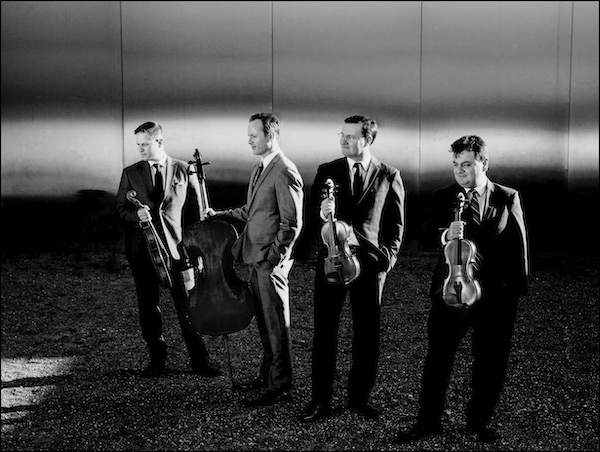Jerusalem Quartet shines in Celebrity Series return

The Jerusalem Quartet won this city’s classical music heart with their Celebrity Series of Boston debut in 2014, a rapturously received program of Haydn, Brahms and Shostakovich. A return engagement on Saturday — the group’s third Celebrity Series date — drew a surprisingly below-capacity crowd to Jordan Hall, even with a similarly fetching set of Haydn, Brahms and Bartók on tap.
But the acclaimed quartet took the empty seats in stride, if they took note of them at all, and picked up in 2019 where their memorable 2014 premiere left off.
In this latest outing, first violinist Alexander Pavlovsky, second violinist Sergei Bresler, violist Ori Kam and cellist Kyril Zlotnikov prioritized spacious phrasing and fulsome tone. Neither beautiful for beauty’s sake nor self-consciously mannered, their performance aimed for and achieved a big, encompassing smoothness of sound even in the music’s most aggressive moments.
Starting with Haydn’s Quartet in D Minor, Op. 76, No. 2., “Quinten,” Jerusalem emphasized the graceful side of this work from the Viennese master’s last complete set of quartets. The titular “fifths” in the first movement fell in wide, unhurried strokes, and Pavlovsky took his time telling Haydn’s dour tale, also dispatching the ornate passages of the second movement with similar cool confidence. The elegance of this Andante o più tosto allegretto is sometimes treated as subtle parody. This ensemble’s massaged cadences and crisp accents made for a genteelly serious account.
The third movement Menuetto is nicknamed the “Witches’ Minuet” for its spectral violins in canon with viola and cello. Zlotnikov’s convincingly ponderous bass lines and the ensemble’s measured delivery made for one stomping sorceress. The Finale: Vivace featured a snappier beat and more slicing attacks — Pavlovsky audibly had fun exaggerating and then fading the stray high note Haydn inserts into this fiddling conclusion.
Jerusalem’s thick, cultivated sound may seem at odds with the unnerving chromaticism of Bartók’s String Quartet No. 4. Yet the work’s fragments of folk music and chord clusters remained lucid and threatening as they slid against one another in tight imitation. The array of extended violin techniques called for by Bartók — including harmonics, glissandos, strums and strikes with the bow — emerged with impressive clarity and unity.
The quartet’s natural warmth enhanced the melodic material of the third movement’s “night music” while making the harmonic and dynamic turns that much more startling. Zlotnikov’s tense cello work brought focus to the movement’s mysteriousness, and second violinist Bresler’s calculated grating revealed something tortured underlying the nocturnal air. The fourth movement, entirely pizzicato, momentarily highlighted Kam’s rich, centered viola: His plucks were like talking drums amidst all the playful but still-poised rhythmic displacement.
The closing Allegro molto found the Jerusalem Quartet at its most hard-hitting. Swooping violins gave way to harsher tones and an acrid wheeze that came off like a demonic squeezebox in Bartók’s rustic dance finale.
Following intermission, Brahms’s Quartet in C minor, Op. 51, No. 1, started quietly and built quickly before settling into a broad, carefully shaped eighth note pulse. This first of Brahms’s published quartets (after the self-critical composer had destroyed twenty or so previous attempts) pits bold outer movements against intimate inner sections. Jerusalem’s gradations of volume, with deftly unfurled ascending phrases, made for a purposefully detached opening Allegro.
In lesser hands, the prominent vibrato and long transitional pauses the quartet employed where the score is marked “espressivo” could have easily derailed the second-movement Romanze, yet Brahms’s proud, earnest melody prevailed.
The third movement began as a firm, straightforward dance — without the ominous overtones of some interpretations — before exploring texture and balances between the four strings. Zlotnikov’s foundation and Bresler’s lines peeked out at key moments, and Kam’s buttery solo spoke articulately from inside the mix. In the closing Allegro, the group’s precise but still organic interplay and thoughtful pacing detailed each of the composer’s themes and contrapuntal moves. The drama was all there, seething rather than explosive.
Given the sense of control across the program, the encore of “Czech Folk Music” from Schulhoff’s Five Pieces for String Quartet, with stabbing double stops and racehorse momentum, found the Jerusalem Quartet cutting loose to an almost ironic degree.
Celebrity Series of Boston presents the Gewandhausorchester Leipzig directed by Andris Nelsons with soloists Leonidas Kavakos and Gautier Capuçon in Brahms’s Double Concerto and Schubert’s Symphony No. 9, “The Great,” 3 p.m. Sunday at Symphony Hall. celebrityseries.org; 617-482-2595
Posted in Performances




